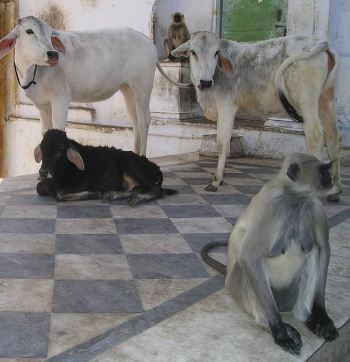WC '17 Finals J2 - Redundant Formations
View as PDFWoburn Challenge 2017-18 Finals Round - Junior Division

After capturing and interrogating all of the alien spies from within the cow army, Bo Vine has learned of the Party of Extraterrestrial Gangsters' plans for an imminent invasion of Earth. An important realization then dawned on him — now is not the time to engage in petty quarrels with the monkeys. All of Scarberia must join forces, at least temporarily, to face an even greater evil. Knowing this, Bo Vine approached the Head-Monkey seeking a truce. After a long night of negotiation, the stubborn Head-Monkey at last admitted to the gravity of the situation. Both the cows and monkeys thus decided to unite their armies against the fearsome PEG!
Now, Bo Vine and the Head-Monkey must discuss battle formations for each
of their battalions. To keep it simple, they have both decided to stick
with a standard line formation, organized into platoons of cows and
monkeys in sequence. In their discussion, they will denote each possible
battle formation as a non-empty string of up to
characters. Each
character in the string will either be
C or M, denoting either a
cow platoon or a monkey platoon, respectively. Of course, the big
question is: what is the best possible arrangement of platoons?
The aliens of PEG are a mysterious bunch. Bo Vine and the Head-Monkey
know that they should be prepared to face all kinds of battle styles. As
such, it is certainly a good idea to maximize variety in the formation
they choose. Just what does this mean? For a given cow-monkey formation
, let us define a sub-formation of
to be any pattern of one or
more cow/monkey platoons which appears at least once within
as a
contiguous subsequence. The commanders realize that any sub-formation
occurring more than once in
is unnecessary, especially when it
overlaps with another instance of itself. To be precise, a sub-formation
is considered to be redundant if it occurs at least twice in the
original formation
, and two different instances of it overlap with
each other (in other words, they have at least one index of
in
common).
Given a particular formation of cow-monkey platoons that Bo Vine and the Head-Monkey are considering, can you help them count the number of redundant sub-formations?
Subtasks
In test cases worth of the points,
contains at most
characters.
Input Specification
The first and only line of input consists of a single string, .
Output Specification
Output a single line consisting of a single integer, the number of redundant sub-formations.
Sample Input
CCCMMCMMCMMSample Output
7Sample Explanation
The redundant sub-formations are CC, CMMC, CMMCM,
CMMCMM, MMCM, MMCMM, and MCMM. For example, CC is
redundant because it appears in starting at both the first and
second indices, and these two instances overlap with each other at the
second index.
Comments